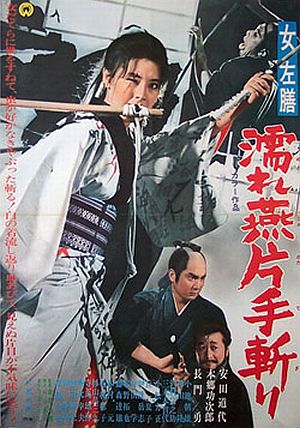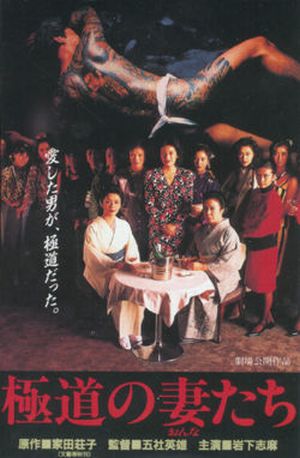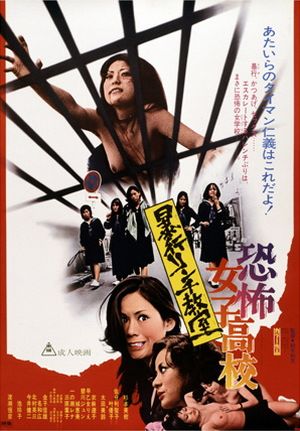★★½
“The middle word in the title is easily the most applicable. Far and away.”
 In the near-future, Japan is plagued by “engineers” – criminals who have voluntarily undergone genetic modifications, which not only mutate their bodies in bizarre ways, but give them near superpowers and the ability to sprout weapons from their wounds. To combat this, the privatized Japanese police force under their chief (Benny) has an absolutely no-holds barred policy of shoot first, ask questions… Well, don’t bother asking questions. Their top “engineer hunter” is Ruka (Shiina, whom you may recognize from Audition), the daughter of a police officer who was killed in the line of duty while she was just a young girl. She is tracking down the scientist behind the engineers, known as “Key Man” (Itao) because of the key-shaped tumours which trigger the mutations. But when they meet, he infects her – and also reveals the truth behind the deaths of both their fathers.
In the near-future, Japan is plagued by “engineers” – criminals who have voluntarily undergone genetic modifications, which not only mutate their bodies in bizarre ways, but give them near superpowers and the ability to sprout weapons from their wounds. To combat this, the privatized Japanese police force under their chief (Benny) has an absolutely no-holds barred policy of shoot first, ask questions… Well, don’t bother asking questions. Their top “engineer hunter” is Ruka (Shiina, whom you may recognize from Audition), the daughter of a police officer who was killed in the line of duty while she was just a young girl. She is tracking down the scientist behind the engineers, known as “Key Man” (Itao) because of the key-shaped tumours which trigger the mutations. But when they meet, he infects her – and also reveals the truth behind the deaths of both their fathers.
The most obvious parallel would by Robocop, not only in the cautionary tale of law-enforcement run for profit, but also the sardonic commercials which pepper proceeding, showing how brutal society has become [here’s an example, for a wrist-cutting knife]. It’s against this backdrop that the cold, to the point of being emotionally-dead, heroine plies her trade, troubled by a past that she can’t forget. Shiina is certainly good at that kind of role, but it’s more or less a one-note performance, that doesn’t provide much reason for the audience to empathize with her. However, I get the sense that, as far as director Nishimura is concerned, characterization is probably not quite the main thing he’s concerned with here.
That would, instead, be the splatter, which goes to a whole new level, even by the outrageous standards of the genre. The arterial spray is so copious and powerful that, at one point, an engineer uses it to propel himself about, like a haemoglobin propelled jet-pack. That pretty much sums up the tone to be found here, with body parts also flying when not attached to their owners. It’s arguably the goriest movie ever made, though I’d have to re-watch Peter Jackson’s Brain Dead before I can be certain on this front. However, there isn’t quite enough to sustain it, especially at a fairly extended running-time of 110 minutes. While there no shortage of surreal imagination on view (like the creature which has had all four limbs replaced with samurai swords), and it’s undeniably the most OTT of its siblings, this probably works better as a party tape, playing in the background for your next Halloween bash, given its apparent apathy towards more conventional cinematic attributes.
Dir: Yoshihiro Nishimura
Star: Eihi Shiina, Itsuji Itao, Yukihide Benny, Shoko Nakahara






 A sequel to One-Eyed One-Armed Swordswoman, this stands more than well enough on its own merits, with an interesting and complex storyline and engaging characters. As a young girl, Lady Sazen (Ohkusu) lost both an arm and her eye to the devilish Lord Daizen-dayu, who coveted the titular sword owned by her father. Sazen barely escaped with it and her life, and is now a wandering swordswoman, roaming the countryside. She saves a girl being chased by some thugs, and it turns out that she knows all the inside dirt on a corrupt priest, and he won’t stop until she has been silenced. Meanwhile, Daizen-dayu hasn’t given up on the sword, and has hired another samurai to get it from Sazen, bu any means necessary.
A sequel to One-Eyed One-Armed Swordswoman, this stands more than well enough on its own merits, with an interesting and complex storyline and engaging characters. As a young girl, Lady Sazen (Ohkusu) lost both an arm and her eye to the devilish Lord Daizen-dayu, who coveted the titular sword owned by her father. Sazen barely escaped with it and her life, and is now a wandering swordswoman, roaming the countryside. She saves a girl being chased by some thugs, and it turns out that she knows all the inside dirt on a corrupt priest, and he won’t stop until she has been silenced. Meanwhile, Daizen-dayu hasn’t given up on the sword, and has hired another samurai to get it from Sazen, bu any means necessary. The film manages to cram just about every cliché of martial-arts films into its 92 minutes, with a plot driven by four major threads:
The film manages to cram just about every cliché of martial-arts films into its 92 minutes, with a plot driven by four major threads: The entertainment value you get from this may depend on your expectations. It undoubtedly works best as a party-tape, show-casing the “no wires, CGI or stunt doubles” approach, but I have to beg to differ with some of the critical savaging it has received. Even
The entertainment value you get from this may depend on your expectations. It undoubtedly works best as a party-tape, show-casing the “no wires, CGI or stunt doubles” approach, but I have to beg to differ with some of the critical savaging it has received. Even  Last month, we saw MMA star Gina Carano hit the big-screen in Haywire, but she’s not the first genuine female martial-artist to have started a movie career. Most obviously, Cynthia Rothtock was a five-time World Karate Champion in forms and weapons, and has a number of black belts in various disciplines. Similarly, Jeeja Yanin was a third-Dan black belt in Taekwondo, before hitting the silver screen in Chocolat. But here, we’ll be looking at the name that has recently emerged out of Japan, Rina Takeda, holder of a black belt in Ryukyu Shorin-ryu Karate.
Last month, we saw MMA star Gina Carano hit the big-screen in Haywire, but she’s not the first genuine female martial-artist to have started a movie career. Most obviously, Cynthia Rothtock was a five-time World Karate Champion in forms and weapons, and has a number of black belts in various disciplines. Similarly, Jeeja Yanin was a third-Dan black belt in Taekwondo, before hitting the silver screen in Chocolat. But here, we’ll be looking at the name that has recently emerged out of Japan, Rina Takeda, holder of a black belt in Ryukyu Shorin-ryu Karate. From the director of Alien vs. Ninja, the story here centres on a pair of ninjas, Shimotsuki and Hyotsuki, who are carrying on what appears to be a family tradition, kidnapping women from other clans’ villages, and taking them back to their own for nefarious purposes – let’s just say, the phrase “tools of pleasure” crops up on more than one occasion. They ar returning with their latest batch of four, including Kisaragi (Takeda), who is a ninja in her own right. With the help of a mysterious man (Sato), Kisuragi and her colleagues in imprisonment are released from their bondage – but that is only the first obstacle between them and their freedom. Of course, it turns out the heroine is not quite as innocent as she appears, and has an agenda of her own, because her mother was kidnapped by the same sleazy ninjas, when Kisuragi was just a baby.
From the director of Alien vs. Ninja, the story here centres on a pair of ninjas, Shimotsuki and Hyotsuki, who are carrying on what appears to be a family tradition, kidnapping women from other clans’ villages, and taking them back to their own for nefarious purposes – let’s just say, the phrase “tools of pleasure” crops up on more than one occasion. They ar returning with their latest batch of four, including Kisaragi (Takeda), who is a ninja in her own right. With the help of a mysterious man (Sato), Kisuragi and her colleagues in imprisonment are released from their bondage – but that is only the first obstacle between them and their freedom. Of course, it turns out the heroine is not quite as innocent as she appears, and has an agenda of her own, because her mother was kidnapped by the same sleazy ninjas, when Kisuragi was just a baby. Perhaps a better title, however, would be Yakuza Sister, since this is a tale of two siblings. Tamaki (Iwashita) is an actual mid-level Yakuza wife, who is running their branch of the gang in the jailed absence of her husband, and doing quite well at it, enhancing its size and reputation. She is largely estranged from both her sister Makoto (Kitase) and their father – she’s a bartender, he works in his machine shop, but it’s clear from the get-go that his time is limited [this isn’t much of a spoiler when you see him coughing his lungs out while simultaneously chain-smoking]. Two things upset their semi-orderly lives. The overall head of Tamaki’s clan dies, opening up a power vacuum which sets off a struggle between rival factions, and Tamaki attempts to arrange a ‘suitable’ marriage for her sister. Makoto rebels, taking up instead with Kiyoshi Sugita (Sera) – which is unfortunate, because he’s a loyal member of the faction now battling Tamaki’s group for control.
Perhaps a better title, however, would be Yakuza Sister, since this is a tale of two siblings. Tamaki (Iwashita) is an actual mid-level Yakuza wife, who is running their branch of the gang in the jailed absence of her husband, and doing quite well at it, enhancing its size and reputation. She is largely estranged from both her sister Makoto (Kitase) and their father – she’s a bartender, he works in his machine shop, but it’s clear from the get-go that his time is limited [this isn’t much of a spoiler when you see him coughing his lungs out while simultaneously chain-smoking]. Two things upset their semi-orderly lives. The overall head of Tamaki’s clan dies, opening up a power vacuum which sets off a struggle between rival factions, and Tamaki attempts to arrange a ‘suitable’ marriage for her sister. Makoto rebels, taking up instead with Kiyoshi Sugita (Sera) – which is unfortunate, because he’s a loyal member of the faction now battling Tamaki’s group for control. This was my first true vintage “pinky violence” movie, though I had bumped against some fringe entries in the genre before e.g. Female Convict Scorpion: Jailhouse 41, which I enjoyed and really must get round to reviewing for here some time. This one…not so much. It focuses on Rika (Oshida), who gets out of reform school, and gets a job as a ‘companion’ at a bar, where most of the girls have a similarly troubled background. The local Yakuza boss is sniffing around, and his path crosses Rika’s after she (semi-unwittingly) helps a colleague steal some drugs from them. As a result, the house mother/bar owner, is on the hook for three million yen, plus interest.
This was my first true vintage “pinky violence” movie, though I had bumped against some fringe entries in the genre before e.g. Female Convict Scorpion: Jailhouse 41, which I enjoyed and really must get round to reviewing for here some time. This one…not so much. It focuses on Rika (Oshida), who gets out of reform school, and gets a job as a ‘companion’ at a bar, where most of the girls have a similarly troubled background. The local Yakuza boss is sniffing around, and his path crosses Rika’s after she (semi-unwittingly) helps a colleague steal some drugs from them. As a result, the house mother/bar owner, is on the hook for three million yen, plus interest.
 With a bit more of an intricate plot than most entries, this is the tale of revenge served cold. The Oba Yakuza gang shoot one of their flunkies up with drugs and dump his dead body in a ditch. His daughter, Maki (Ike), tries to stab the boss responsible (Hayama) in a nightclub, but she is, frankly, a bit crap with a blade; the attack fails, and she ends up in prison. There, after proving her toughness in a jail “I quit” match, she is accepted by the other girls, including the heavily-tattooed Masayo (Sugimoto). A few years pass, and Maki gets out of jail; her friends are waiting, and they agree to help in her plan for vengeance. This involves Tetsu, the psycho scion of the Hamayasu clan, who used to rule things before the Oba group came in and kicked their asses. Maki will use him as the scapegoat, to trigger war between the groups, then step in to take out Oba once he has been weakened. That’s the plan, anyway, with Maki whoring herself out, to (gasp!) foreigners and even (shock!) a black airman to get resources. However, a large spanner in the works is that Masayo is also Oba’s wife…
With a bit more of an intricate plot than most entries, this is the tale of revenge served cold. The Oba Yakuza gang shoot one of their flunkies up with drugs and dump his dead body in a ditch. His daughter, Maki (Ike), tries to stab the boss responsible (Hayama) in a nightclub, but she is, frankly, a bit crap with a blade; the attack fails, and she ends up in prison. There, after proving her toughness in a jail “I quit” match, she is accepted by the other girls, including the heavily-tattooed Masayo (Sugimoto). A few years pass, and Maki gets out of jail; her friends are waiting, and they agree to help in her plan for vengeance. This involves Tetsu, the psycho scion of the Hamayasu clan, who used to rule things before the Oba group came in and kicked their asses. Maki will use him as the scapegoat, to trigger war between the groups, then step in to take out Oba once he has been weakened. That’s the plan, anyway, with Maki whoring herself out, to (gasp!) foreigners and even (shock!) a black airman to get resources. However, a large spanner in the works is that Masayo is also Oba’s wife… After my disappointing first foray, this is more like it, right from the moment Sachiko (Sugimoto) rips open her top, revealing a heavily-tattooed breast, before she and her Red Helmet Gang of biker chicks kick the asses of another, male gang who are hassling them. It’s clear that Sachiko deserves the title far more that the ‘Delinquent Girl Boss’. She and her crew from Tokyo head off to Kyoto, where they face off against, and end up taking control of, the local girl gang – some of whom are none to happy by this invasion [Kyoto being the former capital, its residents seems to hold a grudge against those from Tokyo]. Sachiko ends up on the wrong side of the local Yakuza, one of whom has a sister, Nami (Ike), who is an independent free-agent girl gangster, affiliated with none, but kinda over-seeing all. Sachiko meets and falls for a boxer, Ichiro (Mizushimi), after he helps her girls out of a tough spot with the Yakuza, and follows him to a seaside resort where he is training. Needless to say, love does
After my disappointing first foray, this is more like it, right from the moment Sachiko (Sugimoto) rips open her top, revealing a heavily-tattooed breast, before she and her Red Helmet Gang of biker chicks kick the asses of another, male gang who are hassling them. It’s clear that Sachiko deserves the title far more that the ‘Delinquent Girl Boss’. She and her crew from Tokyo head off to Kyoto, where they face off against, and end up taking control of, the local girl gang – some of whom are none to happy by this invasion [Kyoto being the former capital, its residents seems to hold a grudge against those from Tokyo]. Sachiko ends up on the wrong side of the local Yakuza, one of whom has a sister, Nami (Ike), who is an independent free-agent girl gangster, affiliated with none, but kinda over-seeing all. Sachiko meets and falls for a boxer, Ichiro (Mizushimi), after he helps her girls out of a tough spot with the Yakuza, and follows him to a seaside resort where he is training. Needless to say, love does